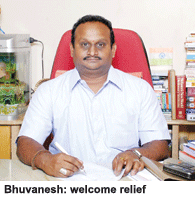The managements of Tamil Nadu’s 5,934 private unaided schools affiliated with the Matriculation Board, collectively breathed a huge sigh of relief on September 14. Delivering judgement on a batch of writ petitions filed by them challenging the imposition of a fee structure on them by a May 7 state government order, the Madras high court stayed the imposed fee structure for the current academic year and fixed the final hearing of the petitions on November 29.
Private unaided Matriculation schools are unique to Tamil Nadu. They follow a special curriculum formulated by the Board of Matriculation Schools (estb.1977) until class X after which they revert to the common state board syllabus. However in July 2009 the state government formally abolished the state’s four separate school examination boards, i.e. the Tamil Nadu Secondary School Leaving Certificate Examination; Anglo Indian School Certificate Examination; Matriculation; and Oriental School Leaving Certificate Examination boards, and replaced them with a common Tamil Nadu State Board of Secondary Education (TNSBSE). Subsequently on January 11 this year, the state government passed a Uniform System of School Education Act 2010 which decrees a common curriculum for all schools affiliated with the TNSBSE.
The state government’s moves to end the limited autonomy of Matriculation schools which were embarrassingly superior to government-run primary-secondaries began last summer with the enactment of the Tamil Nadu Schools (Regulation of Collection of Fee) Act, 2009, which imposed a government-devised fee structure upon all private unaided Matriculation schools and 5,000 private nursery and primary schools, now per force affiliated with TNSBSE.
The common tuition fees structure was finalised by a state government-appointed Private School Fee Determination Committee headed by Justice K.Govindarajan in December 2009. The committee stipulated maximum tuition fees of Rs.11,000 per annum for all TNSBSE-affiliated private higher secondaries; Rs.9,000 for private high schools; Rs.8,000 for middle schools; Rs.5,000 for elementary schools and Rs 3,500 for private elementary schools in rural Tamil Nadu. According to the committee, these ceilings were imposed after collecting data relating to average fees, student strength, salaries of teachers and other expenses.
Initial appeals to the courts were unsuccessful. The Tamil Nadu Nursery, Matriculation and Higher Secondary Schools Association’s writ petition was rejected on April 9 by the Madras high court, notwithstanding the Supreme Court’s 11-judge verdict in the T.M.A Pai Foundation Case (2002) which had upheld the right of private unaided educational institutions to levy “reasonable” fees without government interference. On May 10 the Supreme Court also upheld the judgement of the Madras high court.
Unwilling to accept defeat, the Federation of Associations of Private Schools in Tamil Nadu filed another writ petition which came up for hearing on September 14 before Justice K.B.K.Vasuki. In her order, the learned judge stayed the imposition of the new fee structure for the current academic year. “This court has no hesitation to say that the government order was not validly passed so as to make it binding on and enforceable against the respective schools. The committee’s orders are not only provisional in nature but also suffer from violation of statutory requirements and principles of natural justice,” she said.
 Justice Vasuki’s judgement has been welcomed even if it provides temporary relief to managements of Matriculation schools. “If the high court had not ruled in our favour we would have been forced to withdraw Smart Class initiatives among other programmes introduced in our school,” says R.J. Bhuvanesh, chief executive officer of Kaligi Ranganathan Montford Matriculation Higher Secondary School, which has 4,400 students instructed by 230 teachers.
Justice Vasuki’s judgement has been welcomed even if it provides temporary relief to managements of Matriculation schools. “If the high court had not ruled in our favour we would have been forced to withdraw Smart Class initiatives among other programmes introduced in our school,” says R.J. Bhuvanesh, chief executive officer of Kaligi Ranganathan Montford Matriculation Higher Secondary School, which has 4,400 students instructed by 230 teachers.
Informed monitors of the academic scene in Tamil Nadu (pop: 62 million) believe that the imposition of a government-determined tuition fee on private unaided Matriculation Board-affiliated and other independent schools is a cynical attempt by the politico-bureaucratic nexus in the state to expand its control over all 11,186 private secondary (including CISCE and CBSE affiliated) schools in the state. That’s the well-known formula for increasing the powers of patronage, recruitment and extortion of politicians and bureaucrats. And parents protesting — instead of negotiating — tuition fees are gullible allies of the politico-bureaucratic nexus.
Hemalatha Raghupathi (Chennai)